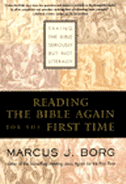IS THE BIBLE A WORK OF GOD OR A WORK OF HUMANS
Everything depends on how we measure the
Bible as HUMAN RESPONSE to God. We will perceive
everything differently depending on whether
we see the Bible as from God or from humans.
If we see through the lens of NATURAL LITERALISM,
we will see God as guiding the writing of
the Bible and that scripture comes then FROM
God. If however we see the Bible as a HUMAN
PRODUCT, we will see the Bible as a product
of ancient Israel and of the early church.
Borg sees the Bible in through this second
lens. "I see the Bible as a human response
to God. Rather than seeing God as scripture's
ultimate author, I see the Bible as the response
of these two ancient communities to their
experience of God."
FIVE CASES TO ILLUSTRATE.
1. Literalism believes the Bible is
God speaking.
And so it has great authority. It changes
when we consider that whoever is speaking,
it is that person's voice and circumstances
- albeit a comment, an experience of
God's
view is being expressed perhaps.
2. Genesis stories. If one, then these
are
God's stories of creation. If the other,
they are an ancient peoples stories.
The
first perspective has led to some curious
rationalisations between relgious and
scientific
circules.
3. Law. There is a lot of moral and
legal
rule in the Bible. If we consider God
to
be speaking it has a gravity attached
to
it. We see such in the controversy
today
on homosexuality. It is Borg notes
curious
to say the least that the larger body
of
old law is not read or considered or
followed.
A selective process is in hand.
4. Strange Stories. Selecting a story
in
Exodus of God trying to kill Moses,
Borg
points out there are a lot of strange
stories
that are glossed over by literalists.
If
the Bible is seen as a record of an
ancient
people, then the existance and meaning
of
such stories becomes more interesting.
Why
would God tell this story? becomes
Why would
Isreal tell this story?
5. Women. Borg then takes up the passages
in 1 Timothy against women to illustrate
how much is at stake whether we believe
the
Bible is to be understood as coming
from
God or from humans.
EITHER-OR. There is a group who try
to straddle
the fence on this. Borg points out
the consequence
then becomes a large effort to separate
the
God parts from the Human parts. It
is he
says "all a human product, though
generated
in response to God"
THE BIBLE AS SACRED SCRIPTURE
What does "sacred" mean.
When the
parts were written, they generally
wern't
understood to be sacred. Essentially
it means
a process of canonization. Scholarship
now
understands the Torah to have reached
sacred
status by 400 BCE, the Prophets by
200 BCE,
the Writings by 100 CE, The New Testament
by 367 CE
Sacred also means within and for a
specific
community (cultural-linguistic). "
The
Bible is the "constitution"
of
the Christian world, not in the sense
of
being a collection of laws but in the
sense
of being its foundation."
THE AUTHORITY OF THE BIBLE
Related to the first lens of origins,
we
understand two different sorts of authority
granted the Bible. If from God, then
God
is a kind of Lord (chief ruler).
The second lens leads one to a different
place of "critical dialogue with
the
Bible" which "implies not
simply
that we make discerning judgments about
the
texts. It also means that we allow
the texts
to shape and judge us."
THE BIBLE AS SACRAMENT OF THE SACRED
Sacrament - a means of Grace. "Things
are sacramental when they become occasions
for the experience of God, moments
when the
Spirit becomes present, times when
the sacred
becomes an experiential reality."
Sacramental
use of the Bible is found among Jews,
Christians
and Muslims. There are many practices.
There
is also private devotional reading
of the
Bible.
It has long been the practice of religion
to say "This is the Word of God"
or some similar statement. The New
Zealand
Anglican Book of Common Prayer says
"Hear
what the Spirit is saying to the church."
THE BIBLE AS THE WORD OF GOD.
WORD is not plural. It is metaphorical
and
nonliteral. "Words bridge the
distance
between ourselves and others: we commune
and become intimate through words.
... The
Bible is a means of divine self-disclosure.
... the Bible contains the primary
stories
and traditions that discose the character
and will of God."
CONCLUDING MEAPHORS FOR SEEING THE
BIBLE
A Finger Pointing to the Moon. A good
phrase
borrowed from the Buddhists. Too often
Christians
have mistaken the finger for the moon,
the
Bible for God. If the Bible is necessarily
seen through a lens, some have found
their
believe in the lens.
"Rather, being Christian is about
a
relationship to the God who is mediated
by
the Christian tradition as sacrament.
To
be Christian is to live within the
Christian
tradition as a sacrament and let it
do its
transforming work within and among
us." |



